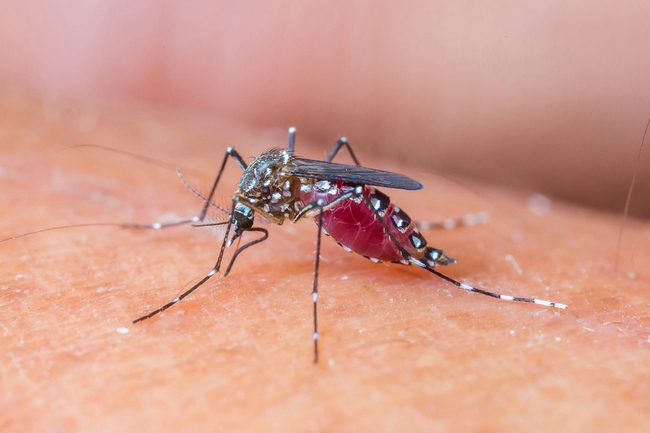- Make It Yourself Lavender Heart-Shaped Bath Bombs!
- 20 Things You Never Knew About “Down There”
- 12 Best Foods For Those Suffering From Arthritis Pain
- 12 Personal Hygiene Mistakes Almost Everyone Makes (Mom Never Told You About #4!)
- 15 Medicinal Plants And Herbs From The Cherokee People
- 12 Mind-Blowing Benefits Of Drinking Coconut Water During Pregnancy
- 12 Outstanding Winter Foods That Won’t Fatten You Up Like A Christmas Turkey
Bloodsuckers Spreading a New Deadly Virus in the U.S.

Photo credit: bigstock.com
Springtime is here friends and you know what that means: sunshine, walks outdoors, camping trips, field trips for the kids and those ugly, bloodsucking, disease infested ticks.
As if ticks on their own are not disgusting enough, the fact that they harbor and spread disease only makes them more repugnant. However, just when you think Lyme disease is about as bad as a tick can get, there is a new, deadly virus that has recently popped up right here in the US. Forget about Ebola in Africa, this one is home-grown, and, as of right now anyway, it’s found in Kansas.
Named after the county in Kansas where it was first discovered, the Bourbon virus was isolated for the first time by the CDC (Centers for Disease Control and Prevention) after the death of a 50 year old man in spring of 2014.
The infected male was working on his property and was the victim of multiple tick bites. The next day, he began feeling as if he were coming down with the flu. His symptoms included fatigue, fever, headaches, body aches, vomiting, nausea, and a rash. The victim had low blood counts for cells that prevent bleeding and fight infection. After 11 days of this illness, the victim suffered a fatal heart attack.
While the victim was hospitalized, doctors there tested him for known infectious diseases, but all tests returned negative. Stumped, the doctors send blood samples to the CDC, where they determined that the victim was suffering from a completely new virus. It’s a type of virus called thogotovirus, which are known to be spread through ticks and other insect bites. Since the victim had suffered from several tick bites just before becoming sick, it is thought that ticks are the most likely culprit that infected the victim.
This information was published in the CDC’s own journal “Infectious Diseases.”
Continue to Page 2

Photo credit: bigstock.com
Now there are several types of thogotoviruses that are known from around the globe, however, this particular strain is new. Also, this is the first thogotovirus that has ever been found in the Western Hemisphere as all other known thogotoviruses have been limited in the past to Africa, Asia, and Europe.
Although this male living in Kansas is, so far, the only known person to have contracted this deadly Bourbon virus, it’s possible that there are, or have been, other infected persons that were not, or have not, yet been identified. As of this writing, the CDC says that there are no lab tests that can determine if someone has become infected, but they are trying to develop one, now that they have isolated the virus.
Tick populations have really boomed in the past 10 years with the increase in the number of white-tail deer and recent reforestation efforts.
Although the standard recommendation for avoiding ticks is to use repellants that contain DEET, but these types of repellants carry another hazard to your health. Up to 25 percent of Natural Park Service Employees report side effects after applying DEET including: numb or burning lips, headaches, nausea, skin rashes, mucous membrane or skin irritation, disorientation, dizziness, and brain fog, according to the Agency for Toxic Substances and Diseases Registry.
Another study conducted in 2009 with animals showed that DEET interferes with the enzymes that are vital to the central nervous system. In fact, in this study, scientists noted that this chemical seemed to work in the same manner those paralyzing nerve gases that are used in warfare work. This study was performed by the Institute of Development Research in France.
Continue to Page 3

Photo credit: bigstock.com
These studies, and more, question the overall safety of DEET. Try using natural essential oils that most insects tend to avoid such as citrus scents, lavender, pennyroyal, basil, cedar, cinnamon, and rosemary oils. Mix two or three of these scents in a small spray bottle and spray all exposed skin before heading outdoors. Take the bottle with you and reapply every few hours.
SEE ALSO: How to Repel Ticks Naturally and Prevent Lyme Disease
Others report that ticks do not like the smell of garlic so, if you don’t mind smelling like Italian or Chinese food, and you know you are going to be outdoors during a certain period of time, you could take garlic supplements about 3 days beforehand to keep the ticks at bay.
Of course, if you live in or around Bourbon County, Kansas, you would be wise to avoid wooded areas, wild areas with tall grass or bushes, and always wear light colored long sleeves, pants, and boots to avoid becoming infected. If you should be bit by a tick and experience flu like symptoms soon afterwards, contact a doctor right away.
Even if you don’t live in or around this area, many types of ticks carry Lyme disease, babesiosis, and human anaplasmosis, all of which cause disease, so you should also avoid places where ticks like to hide such as fallen trees, tall grasses, woodpiles, and thick bushes, so avoid being bitten. Wearing light colored long sleeved shirts, pants, and boots also help to stop ticks from finding your skin and biting you.
References:

































